


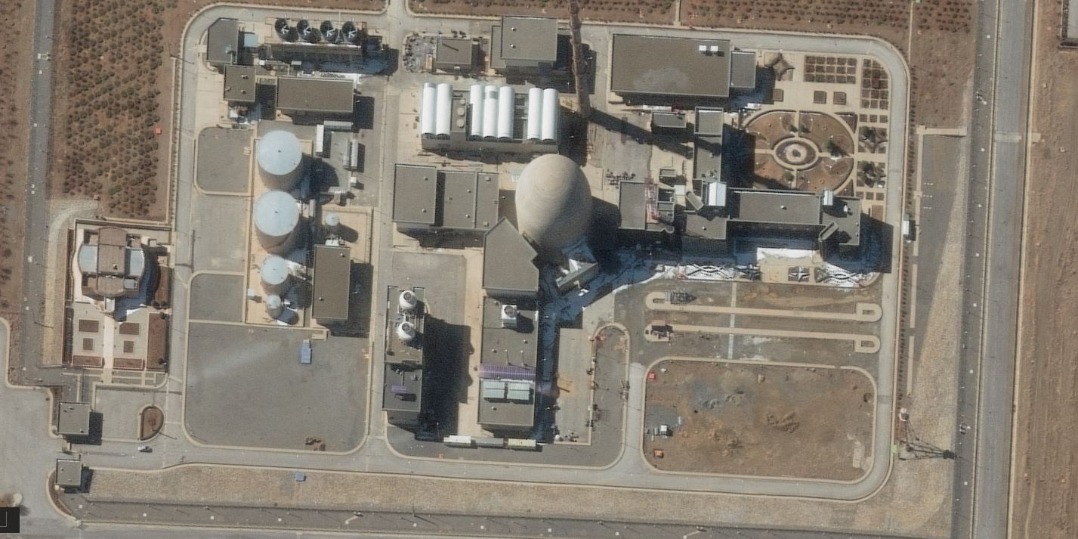
Iranian nuclear facilities may have largely survived attack, initial report says.
UN chief welcomes Trump's announcement of Israel-Iran ceasefire and urges Israel and Iran to fully respect the ceasefire and to stop fighting.
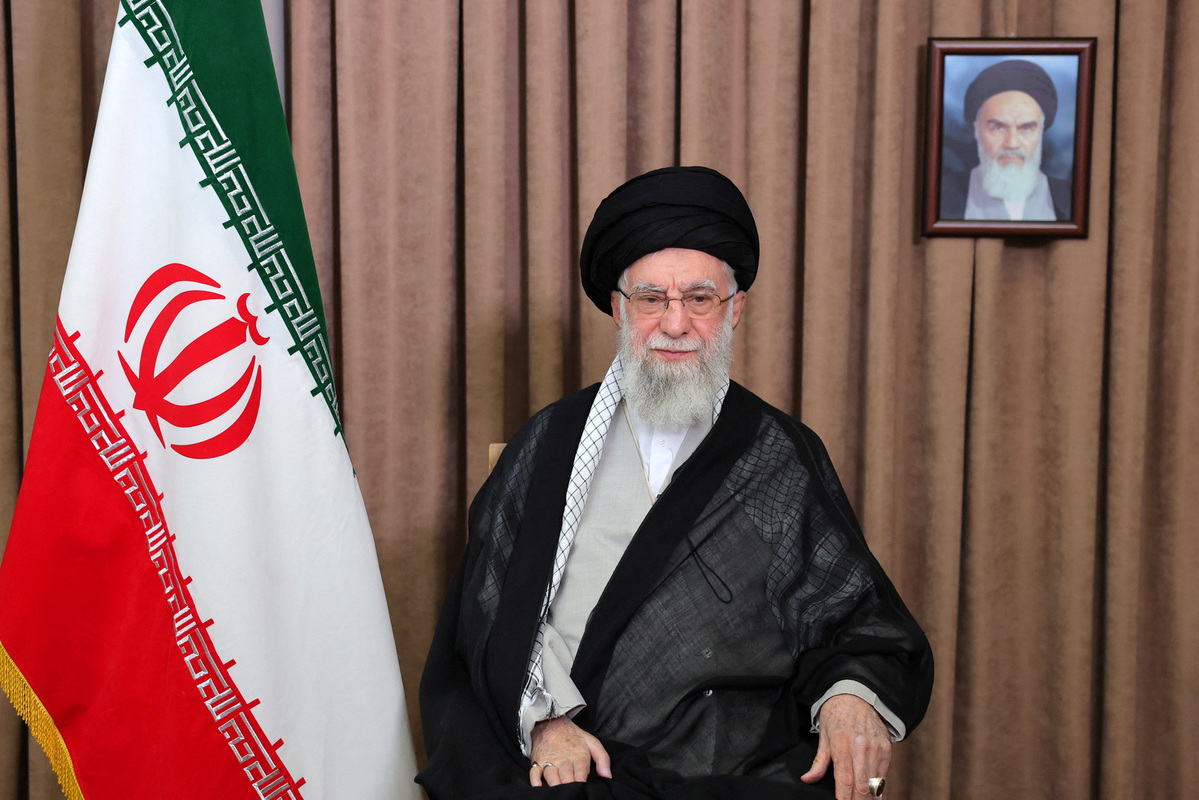
The United States is entering Israeli attacks on Iran "to its own detriment," Iranian Supreme Leader Ayatollah Ali Khamenei repeated an earlier warning to the United States early Sunday after the US bombed key Iranian nuclear sites. At least parts of the cites, especially at the key site of Fordow, were struck, but detailed information on specific damage to the sites was to be confirmed.
Khamenei's Telegram account has re-shared his televised comments on Wednesday, in which he said that the US would be entering the Iran-Israel conflict "to its own detriment,""The damage it will suffer will be far greater than any harm Iran will encounter," Khamenei says in the video.
The Atomic Energy Organization of Iran condemned the US strikes in a statement.
Israeli Prime Minister Benjamin Netanyahu thanks the US president after the US attacks on Iranian nuclear sites, according to the Jerusalem Post. Six bunker-buster bombs were used during the strike on Fordow, with 30 tomahawk missiles being used on the additional nuclear sites, according to Fox News.
However, the Israeli Defense Forces' Home Front Command has raised the threat level nationwide, ordering only essential activity to take place.
An Iranian official in Qom confirmed part of the Fordow nuclear site has come under attack.
Morteza Heydari, a spokesman for Qom Provincial Crisis Management Headquarters, was quoted by Iran's Tasnim news agency as saying: "Hours ago, after Qom's air defenses were activated and hostile targets were identified, part of the Fordow nuclear site was attacked by enemy airstrikes."
The IRNA news agency quotes an official with the country's public broadcaster as saying: "There are no materials in these three nuclear sites that cause radiation."
The comment suggests that Iranian authorities may have removed enriched uranium from the facilities before they were bombed, the report said.
The three nuclear facilities have been evacuated, Iranian national television confirmed.
Iran had been expecting attacks on Fordow for several nights, the facility had been evacuated before the airstrikes occurred, and did not suffer irreversible damage, according to an advisor to Iran's Parliament Speaker.
"Two things are certain: 1. Knowledge cannot be bombed. 2. This time, the gambler will definitely lose," the advisor was quoted by The Jerusalem Post as saying.
On Saturday in Istanbul, Iranian Foreign Minister Abbas Araqchi cautioned the US against the dangerous consequences of getting involved in the Israeli regime's war of aggression.
Araqchi told reporters that it would be "very, very dangerous for everyone" if the United States becomes actively involved in the war along with Israel. He attended diplomatic talks with Europeans in Geneva earlier.
Israeli public broadcaster Kan, citing an anonymous Israeli official, said that Israel was "in full coordination with the US" during its attacks on Iran. B-2 stealth bombers are the only aircraft capable of carrying and deploying the GBU-57A/B Massive Ordnance Penetrator, or MOP, commonly nicknamed The Mother of All Bombs.
BAGHDAD -- The Islamic Resistance in Iraq, an umbrella body for Iraqi Shiite militias, confirmed on Saturday the death of a senior security leader in an Israeli strike on a border area with Iran.
Haider al-Moussawi, head of the security unit of the militias Kata'ib Sayyid al-Shuhada, was killed in the attack, the pro-Iran Islamic Resistance in Iraq said in a statement.
Abu Ali al-Khalil, an aide to the killed Hezbollah leader Hassan Nasrallah, and his son were also killed in the attack, the statement added.
The deaths were caused by an Israeli attack on the border area between Iraq and Iran, the statement said without giving more details.
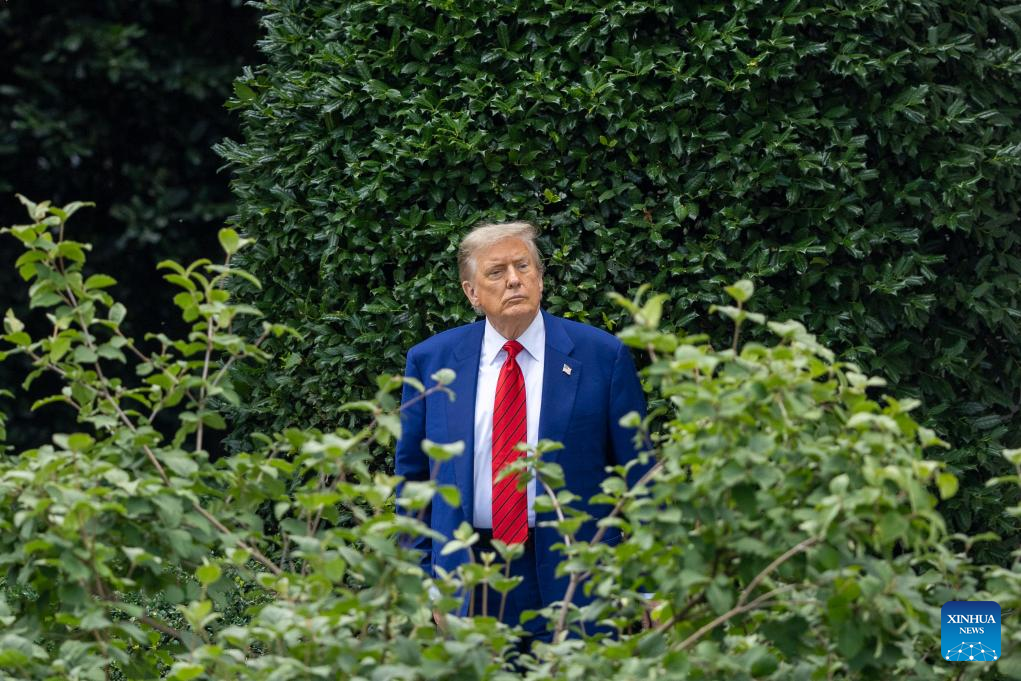
The United States has launched strikes on three Iranian nuclear sites, drawing the US military directly into the conflict after days of uncertainty over whether President Donald Trump would intervene.
"Our objective was the destruction of Iran's nuclear enrichment capacity and a stop to the nuclear threat ...There's no military in the world that could have done what we did tonight," Trump said in a four-minute national address at the White House Saturday night, adding that Iran's nuclear sites are "totally obliterated".
He also warned of possible retaliation from Tehran.
"If peace does not come quickly, we will go after those other targets with precision, speed and skill," he said.
Trump said the strikes targeted Iran's main enrichment sites at Fordo and Natanz, which were hit days earlier by Israel, and a third site near Isfahan, believed to store near-weapons-grade uranium recently inspected by international monitors.
Iranian officials confirmed the attacks and said on state television that Iran had evacuated three nuclear sites that were struck some time ago. They said there were no materials at the sites that could cause radiation.
Iranian state television responded to Trump, saying, "You started it, and we will end it,' and warned that "every American citizen or military personnel in the region is now a target."
Iranian Foreign Minister Abbas Araghchi has not commented since the attack, but earlier on Saturday, he said, "If the United States enters the war, the situation will become very, very dangerous".
Israel's Prime Minister Benjamin Netanyahu said in a video statement that Trump's decision to strike Iran's nuclear facilities would "change history".
"President Trump and I often say: 'Peace through strength.' First comes strength, and then comes peace. And tonight, President Trump and the United States acted with a lot of strength," Netanyahu said.
Earlier Saturday, multiple American B-2 bombers were flying west over the Pacific Ocean and they were used in the strike. These bombers are capable of carrying 30,000-pound 'bunker-buster' bombs designed to penetrate fortified underground facilities.
Trump, who has pledged to avoid "forever wars" during his campaign and in past speeches, said on Thursday he would decide whether to strike Iran "within the next two weeks". After days of uncertainty and conflicting signals, US forces have now been drawn directly into the conflict.
"The thinking in Trump's mind right now is that he could get a quick 'win' with a minimum of military effort and then get to brag about it," Sourabh Gupta, a senior fellow at the Institute for China-America Studies, told China Daily. He previously warned that attacks would affect the US' relations with Iran, the Islamic world, Russia, China and the Middle East.
Gupta added that strikes would "almost certainly exacerbate regional instability and roil oil and gas markets", impacting the global economy.
Jack Midgley, an adjunct associate professor at Georgetown University's Center for Security Studies, told China Daily that the US strikes serve no clear strategic purpose.
"There is no US strategic objective advanced by military action against Iran as it could strengthen Iran's regional position," he said.
He added that Iran's retaliation would cost the US.
"Iran should be expected to take aggressive measures to defend itself," including attacks on US bases in Qatar or Bahrain, cyber-attacks, or closing the Strait of Hormuz, which could disrupt global oil flows, he said.
US lawmakers are divided over the strikes and the country's entry into the Middle East conflict. Even within the Republican Party, some have praised the decision, while others worry the aggressive action could cost the party support from MAGA voters.
Contact the writer at mingmeili@chinadailyusa.com.
WASHINGTON - US President Donald Trump said Saturday that the United States has completed attacks on three nuclear sites in Iran, including "Fordow, Natanz and Esfahan."
"All planes are now outside of Iran airspace. A full payload of BOMBS was dropped on the primary site, Fordow," he said on the social platform Truth Social.
TEHRAN -- Iranian President Masoud Pezeshkian said on Saturday that Iran will not agree to reduce its nuclear activities to zero, according to a statement published on the website of his office.
"We are ready to cooperate and build trust over our peaceful nuclear activities," he told French President Emmanuel Macron in a phone call. "But we will not accept reducing nuclear activities to zero in any way," he said.
Pezeshkian emphasized that his government has sought cooperation with all nations based on mutual respect. However, he blamed Israel for undermining these efforts, citing the assassination of Hamas leader Ismail Haniyeh in Tehran in July 2024, shortly after he took office.
He accused Israel of persistently violating international law through military actions, including recent strikes on Iran. He stressed that Iran does not pursue nuclear weapons and remains open to providing guarantees about the peaceful intent of its nuclear program.
The French president, for his part, said his country had not participated in Israel's military attack against Iran and did not support it, emphasizing that France condemned any attack on non-military and non-nuclear centers.
Macron added that his country had focused all its efforts on stopping the military conflict and de-escalating tensions, noting that France respected countries' integrity and sovereignty and maintained that influencing states' sovereignty through pressure and threats was not a proper solution.
The conversation came amid ongoing hostilities. On June 13, Israel launched major airstrikes on Iranian nuclear and military sites, killing several senior commanders and nuclear scientists. Iran retaliated with missile and drone attacks. As of Saturday, more than 400 Iranians have been killed and over 3,000 wounded, according to Iran's Health Ministry. In Israel, 24 civilians were killed by Iranian missile strikes, according to local authorities.
JERUSALEM -- The Israel Defense Forces said in a statement that it had completed a series of airstrikes in southwestern Iran on Saturday.
The statement said that approximately 30 Israeli Air Force fighter jets struck dozens of military targets, with over 50 munitions, in the area of Ahvaz.
As part of the strikes, jets struck a site where missile launchers were stored, some of which had launched missiles in the past toward Israel, according to the statement.
Israeli jets also struck radar sites used for detection and aerial intelligence gathering, and military infrastructure, the statement added.
TEHRAN -- Iran's Ministry of Roads and Urban Development announced on Saturday the suspension of flights to and from the country will be extended until 14:00 Sunday local time (1030 GMT), the semi-official Tasnim news agency reported.
The restrictions on Iran's airspace would remain in place, to ensure the safety of passengers and flights, unless the country's conditions return to normal, Tasnim quoted the ministry's spokesman Majid Akhavan as saying.
Iran announced the closure of its airspace after Israel on June 13 launched airstrikes on the Iranian capital Tehran and other areas across the country.
Several senior military commanders and nuclear scientists were killed in the Israeli strikes. In retaliation, Iran has carried out missile and drone attacks on various locations in Israel, causing casualties and substantial damage. The conflict has continued into Saturday.
TEHRAN -- Iranian government spokeswoman Fatemeh Mohajerani said on Saturday that the country has not yet resorted to its strategic reserves amid the ongoing conflict with Israel.
Mohajerani made the remarks in a live interview with state-run IRIB TV while stressing that Iran was facing no difficulty in supplying essential products.
She noted that over the past 24 hours, 74,000 tons of essential goods had been imported, and the country was continuing the export of its surplus agricultural crops.
Mohajerani said given the rise in travels to certain provinces, services were being provided in three shifts and supervision had been tightened on to ensure the quality of products.
She added that the trade unions' activities in the capital Tehran had returned to normal, and an increase in traffic at the city' points of entry and exit was being witnessed.
Mohajerani said the suspension of flights to and from the country was still in place to ensure the safety of passengers and flights, emphasizing that given the existing "threats," only national internet was accessible.
She added that since the start of Israel's attacks on Iran, 54 Iranian women and children were killed and 94 others were wounded, and several hospitals across the country were attacked.
Six ambulances were also targeted by Israel and three rescuers of the Iranian Red Crescent Society were killed, Mohajerani said.
Israel launched airstrikes on Iran on June 13, killing several senior military commanders, nuclear scientists. Hossein Kermanpour, head of the Iranian Health Ministry's public relations, said on Saturday that Israeli attacks over the past nine days have killed over 400 Iranians and left 3,056 others wounded.
JERUSALEM - The Israeli Defense Forces (IDF) said in statements on Saturday that it had killed three senior commanders in Iran overnight.
One of them was Saeed Izadi, the commander of the Palestine Corps in the Quds Force, a branch of Iran's Islamic Revolutionary Guard Corps (IRGC), according to the IDF.
Izadi, a key coordinator between the Iran and Hamas, was killed in an air strike in Iran's Qom province, the IDF said.
"Izadi was responsible for increasing the financial funding from Iran to Hamas for activities against Israel," the statement read. "He was also a main orchestrator of the October 7th massacre and one of the few people who knew about it in advance."
The IDF said in a separate statement that its air force also killed Behnam Shahriyari, commander of the Quds Force's weapons transfer unit in the IRGC, in western Iran.
The statement said that Shahriyari was responsible for "weapons transfers from Iran to its proxies" across the Middle East.
"Shahriyari commanded the transfer of hundreds of millions of US dollars annually to various terrorist organizations, utilizing a network of shell companies, money changers, and couriers," the statement read.
Earlier on Saturday, the IDF said that its air force had struck and killed Aminpour Joudaki in southwestern Iran. Joudaki was the commander of the second unmanned aerial vehicle brigade of the IRGC Air Force.
The statement claimed that as part of his role, he had advanced hundreds of drone attacks against Israeli territory from the area of Ahvaz in southwestern Iran.
Meanwhile, Israeli fighter jets had struck missile storage and launch facilities in central Iran, according to a separate IDF statement on Saturday.
The strike was carried out shortly after a barrage of five missiles was fired from Iran towards central Israel, with no casualties reported.
There was no confirmation from the IRGC on the killing of the commanders.
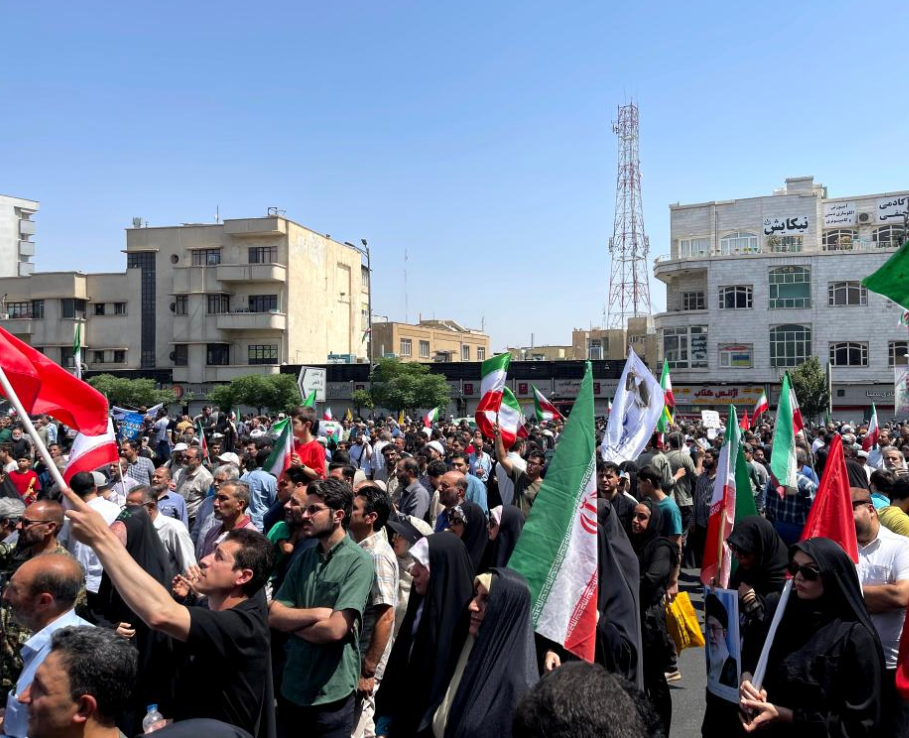
ISTANBUL - Iranian Foreign Minister Seyed Abbas Araghchi said Saturday in Istanbul that while diplomacy "can work in the future" as it has in the past, "aggression must stop" for talks to resume, the state-run Anadolu Agency reported.
Araghchi made the remarks during his attendance at a foreign ministers' meeting of the Organization of Islamic Cooperation in Turkiye. According to Anadolu, Araghchi affirmed Iran's "absolute" readiness for a negotiated solution to the nuclear issue, drawing parallels to the 2015 nuclear deal.
Iran signed the 2015 nuclear deal, formally known as the Joint Comprehensive Plan of Action (JCPOA), with six world powers -- Britain, China, France, Germany, Russia, and the United States. Under the deal, Tehran agreed to curb its nuclear program in exchange for sanctions relief.
Recalling the agreement, Araghchi said, "This was the result of two years of negotiations, and when we signed the agreement, the whole world celebrated it."
On a potential US intervention in its conflict with Israel, Araghchi said the US involvement would be "extremely dangerous" for everyone.
The ongoing Israeli-Iranian conflict started last week, when Israel launched a series of large-scale airstrikes targeting Iranian nuclear and military sites, killing several top commanders and nuclear scientists. In response, Iran retaliated overnight with missile and drone strikes on Israeli territory.
JERUSALEM - Ten drones were launched from Iran throughout Saturday morning into several areas in Israel, according to statements by the Israel Defense Forces (IDF).
One of the drones hit a two-story residential building in the northern Israeli city of Beit Shean, causing heavy damage but no casualties, Israel's national emergency service Magen David Adom (MDA) reported.
Another drone fell in an open area in the Negev desert in southern Israel, resulting in no casualties or damage. The remaining eight drones were intercepted by the Israeli air defense system, according to the IDF.
Earlier, on Saturday pre-dawn, five missiles were fired from Iran towards central Israel.
All the missiles were intercepted by the Israeli air force, with no casualties reported, the IDF said.
According to the MDA, an interception fragment fell and caused a fire in a residential building in the Tel Aviv metropolitan area.

GENEVA - Iranian and European officials held their first face-to-face talks on Friday since the recent escalation in the Israel-Iran conflict, stressing the importance of continued diplomatic engagement.
The meeting, held amongst Iranian Foreign Minister Seyed Abbas Araghchi, his counterparts from Britain, France and Germany (E3), as well as the European Union's (EU) top diplomat, lasted about three and a half hours.
Speaking to reporters after the meeting, Araghchi reiterated that Iran's nuclear program is purely peaceful in nature and remains fully under the supervision of the International Atomic Energy Agency (IAEA).

Iran supports continued consultations with the E3 and the EU, and is prepared to make further efforts to promote peace in the near future, Araghchi added.
After the meeting, British Foreign Secretary David Lammy said that Britain remains committed to ongoing discussions and negotiations with Iran, and urged Tehran to continue its dialogue with the United States.
French Foreign Minister Jean-Noel Barrot noted that France had invited Iran to consider re-engaging in talks with all relevant parties, including the United States. He added that France hopes to see the process move forward.
German Foreign Minister Johann Wadephul said the participants departed the meeting with the understanding that Iran is, in principle, prepared to continue discussions on all key issues.
EU's foreign policy chief Kaja Kallas stated that the parties agreed to broaden the scope of talks beyond the nuclear issue and to maintain openness in their dialogue.
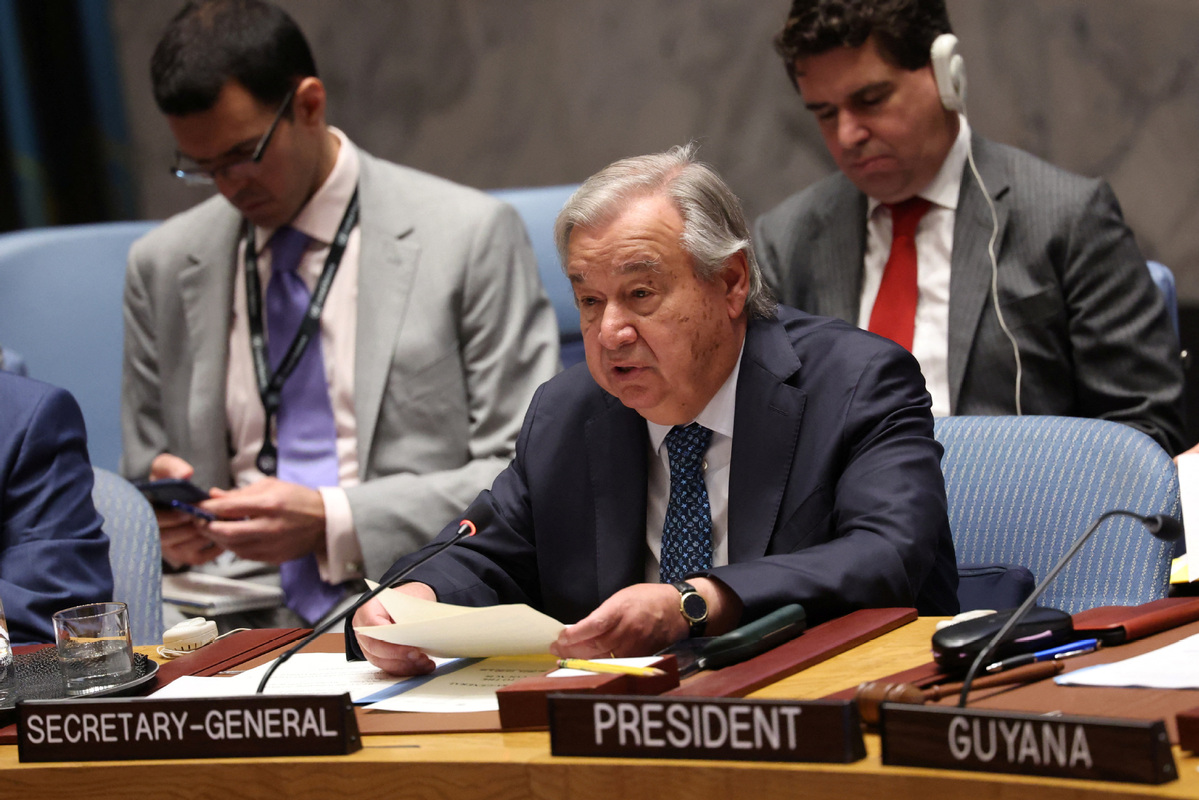
UNITED NATIONS -- UN Secretary-General Antonio Guterres on Friday called for diplomacy to prevent the Israeli-Iranian conflict from spiraling out of control.
In remarks to an emergency meeting of the Security Council, Guterres described the situation as a defining moment for humanity.
"There are moments when the choices before us are not just consequential, they are defining; moments when the direction taken will shape not only the fate of nations, but potentially our collective future. This is such a moment," he said.
The expansion of this conflict could ignite a fire that no one can control, he warned. "We must not let that happen."
The only thing that is predictable is that the consequences of continuing this conflict are unpredictable, he said. "Let us not look back on this decisive moment with regret. Let us act, responsibly and together, to pull the region, and our world, back from the brink."
The confrontation between Israel and Iran is escalating rapidly with a terrible toll -- killing and injuring civilians, devastating homes, neighborhoods and civilian infrastructure, and attacking nuclear facilities, he noted. "The world is watching with growing alarm. We are not drifting toward crisis. We are racing toward it. We are not witnessing isolated incidents -- we are on course to potential chaos."
The central question of this conflict is the nuclear question. Non-proliferation is a must for the safety and security of the world. The Non-Proliferation Treaty is a cornerstone of international security. Iran must respect it. And Iran has repeatedly stated that it is not seeking nuclear weapons, said Guterres.
"Let's recognize there is a trust gap. The only way to bridge that gap is through diplomacy to establish a credible, comprehensive and verifiable solution, including full access to inspectors of the IAEA (International Atomic Energy Agency), as the United Nations technical agency in this field," he said. "For all of that to be possible, I appeal for an end to the fighting and the return to serious negotiations."
Guterres urged the Security Council to act with unity and urgency for dialogue. He urged the international community to rally behind the sole path that can deliver lasting peace: diplomacy grounded in international law, including the UN Charter.
"To the parties to the conflict -- the potential parties to the conflict -- and to the Security Council as the representative of the international community, I have a simple and clear message: Give peace a chance," said Guterres.

NEW YORK -- US President Donald Trump said Friday it will be difficult to request Israel stop its airstrikes in Iran, even as he pursues a diplomatic solution to end the conflict.
Trump made the remarks to reporters in New Jersey, where he attended a fundraiser at his golf course, local media reported.
Trump also dismissed European efforts to engage diplomatically with Iran. "They didn't help... Iran doesn't want to speak to Europe. They want to speak to us. Europe is not going to be able to help on this one."
Earlier, US State Department spokesperson Tammy Bruce said she "can't speculate" on whether the Trump administration will press for a ceasefire between Iran and Israel to allow US-Iran nuclear talks to move forward.
"I'm not going to characterize what's happening now, or the reaction by the president or the secretary of state to what those negotiations might be," Bruce said at a news briefing Friday.

China's envoy to the United Nations on Friday called for "an immediate ceasefire and an end to the fighting", urging international efforts to promote dialogue and ease tensions between Israel and Iran.
Israel's actions "violate international law and the norms of international relations, jeopardize the sovereignty and security of Iran, and undermine regional peace and stability. China unequivocally condemns this," said Fu Cong, China's permanent representative to the UN, at a Security Council briefing on the situation in the Middle East.
"There must be an immediate ceasefire and an end to the fighting," Fu emphasized.
"The use of force is not the right way to resolve international disputes. It will only exacerbate hatred and conflict. The sooner a ceasefire is put in place, the less damage will be done," he said, adding that the situation in the region "cannot be allowed to slide into an unknown abyss."
Fu called on all parties to the conflict—Israel in particular—to "cease fire as soon as possible to prevent the situation from escalating and to avoid any spillover of the fighting."
On June 13, Israeli airstrikes in Iran killed several senior military officials, nuclear scientists, and civilians. In response, Iran launched missile and drone attacks on multiple sites across Israel, resulting in casualties and widespread destruction.
"The safety of civilians must be ensured. The red line of protecting civilians in armed conflicts must not be crossed at any time, and the indiscriminate use of force is unacceptable," Fu said.
He stressed that the parties to the conflict must strictly abide by international law, resolutely avoid harming innocent civilians, refrain from attacking civilian facilities, and facilitate the evacuation of third-country nationals.
More than 3,000 people in Iran have been injured since the start of Israeli strikes, the country's Health Ministry said on Friday. A fresh wave of Iranian missile attacks hit northern Israel the same day, wounding 21 and causing significant damage in Haifa, according to Israel's emergency service.
"We must stay committed to dialogue and negotiation. The current conflict has interrupted the negotiation process on the Iranian nuclear issue. The attacks on multiple Iranian nuclear facilities set a dangerous precedent and could have catastrophic consequences," said Fu.
"We must not waver in the general direction of a political settlement of the Iranian nuclear issue, and we must persist in returning the issue to the track of a political solution through dialogue and negotiation," he said.
Iranian Foreign Minister Seyed Abbas Araghchi is set to meet with his British, French, and German counterparts in Geneva on Friday at their request, Iran's semi-official Mehr News Agency reported on Thursday.
"China welcomes the talks," said Fu. "We must bring together the efforts of the international community to promote peace."
"Without stability in the Middle East, peace in the world will remain elusive," he said, adding that the Israel-Iran conflict has triggered a sudden escalation of tensions in the region and has had a serious impact on global security.
Recently, the foreign ministers of 21 Arab and Islamic countries issued a joint statement calling for a ceasefire, a resumption of talks on the Iranian nuclear issue, and efforts to maintain lasting peace in the region. China fully supports the statement, Fu said.
"The international community, especially major countries with special influence on the parties to the conflict, should make efforts to cool down the situation, rather than the opposite," he said.
"The Security Council, as the primary body responsible for maintaining international peace and security, should play a greater role in this regard. We support the Council in taking necessary actions in a timely fashion," he said.
China stands ready to continue strengthening communication and coordination with all relevant parties, build synergies, uphold justice, and play a constructive role in restoring peace in the Middle East, the ambassador added.
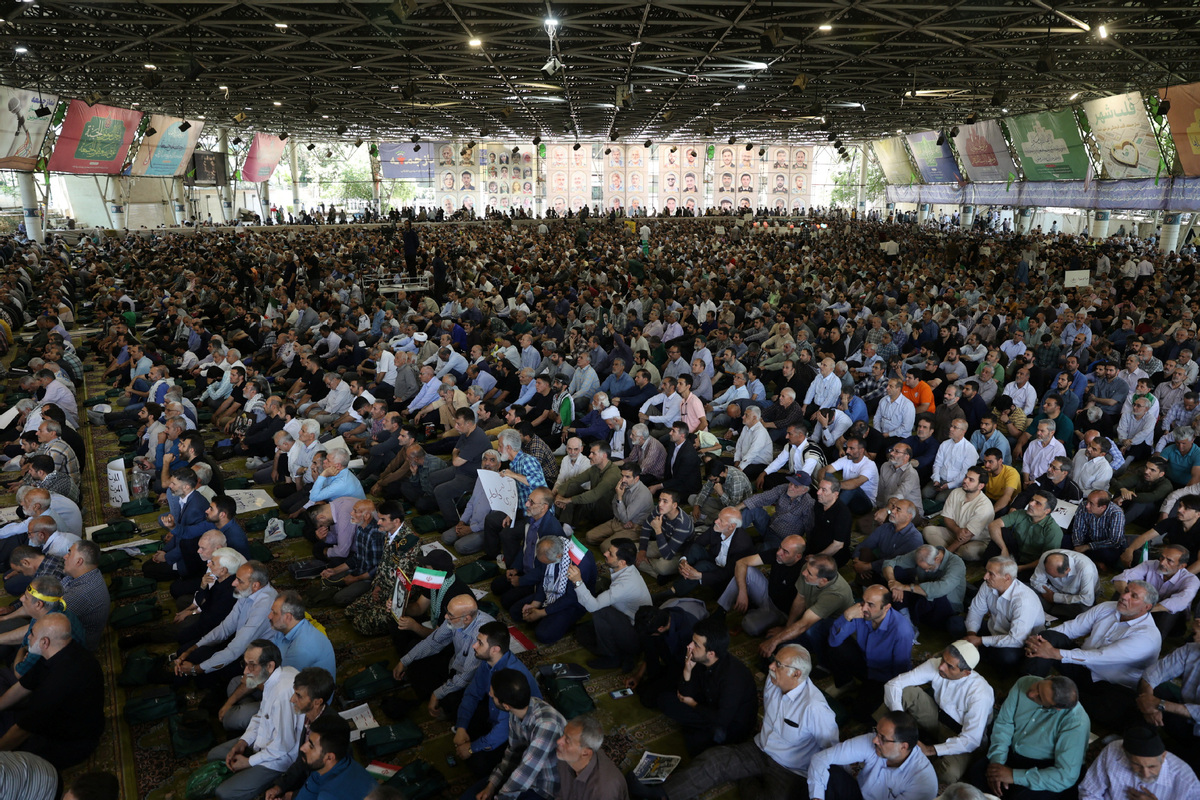
TEHRAN -- Iran's Health Ministry announced Friday over 3,000 people have been injured in the country since the beginning of Israel's attacks.
Hossein Kermanpour, head of the Iranian Health Ministry's public relations, said among the injuries, 2,800 people had been hospitalized, of whom 2,000 were discharged from the hospital, according to a statement published on the ministry's website.
The latest official figures from Iran report 224 deaths from Israeli attacks.
On June 13, Israel launched airstrikes on Iran, killing several senior military commanders, nuclear scientists, and civilians. In retaliation, Iran carried out missile and drone attacks on various locations in Israel, causing casualties and substantial damage. The conflict continued into Friday.
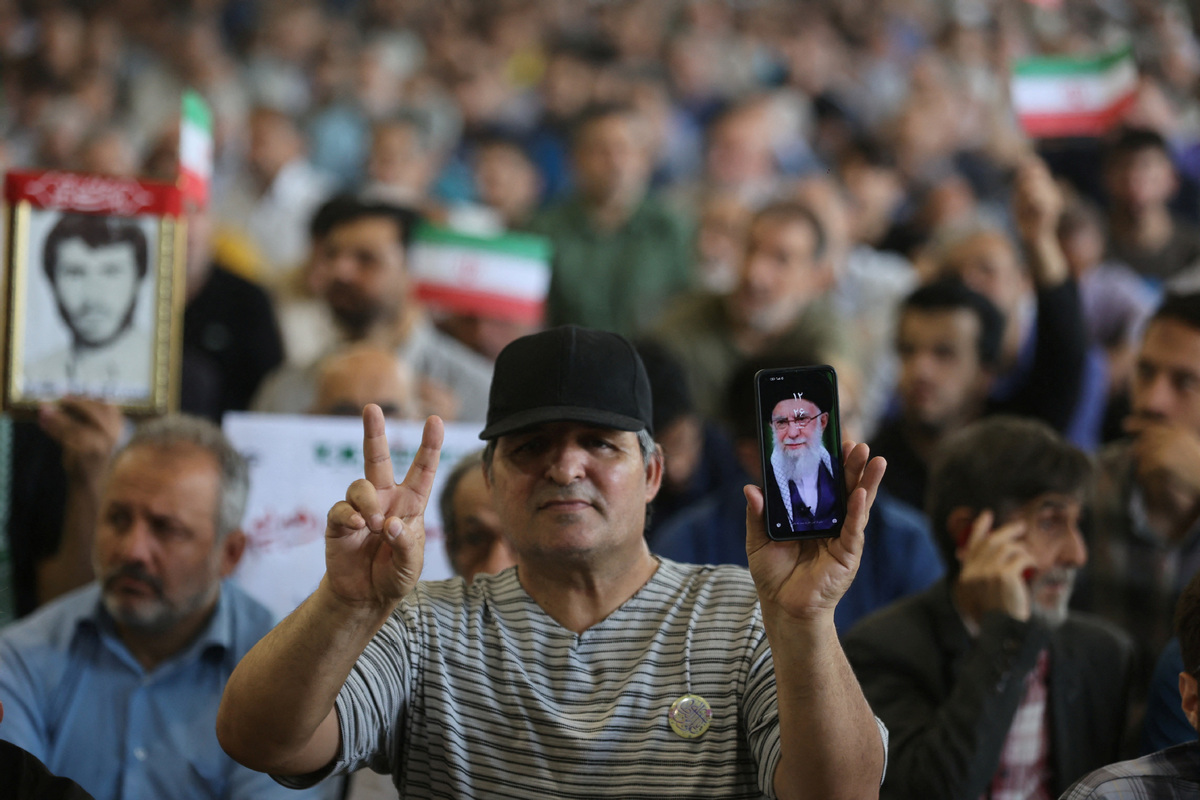
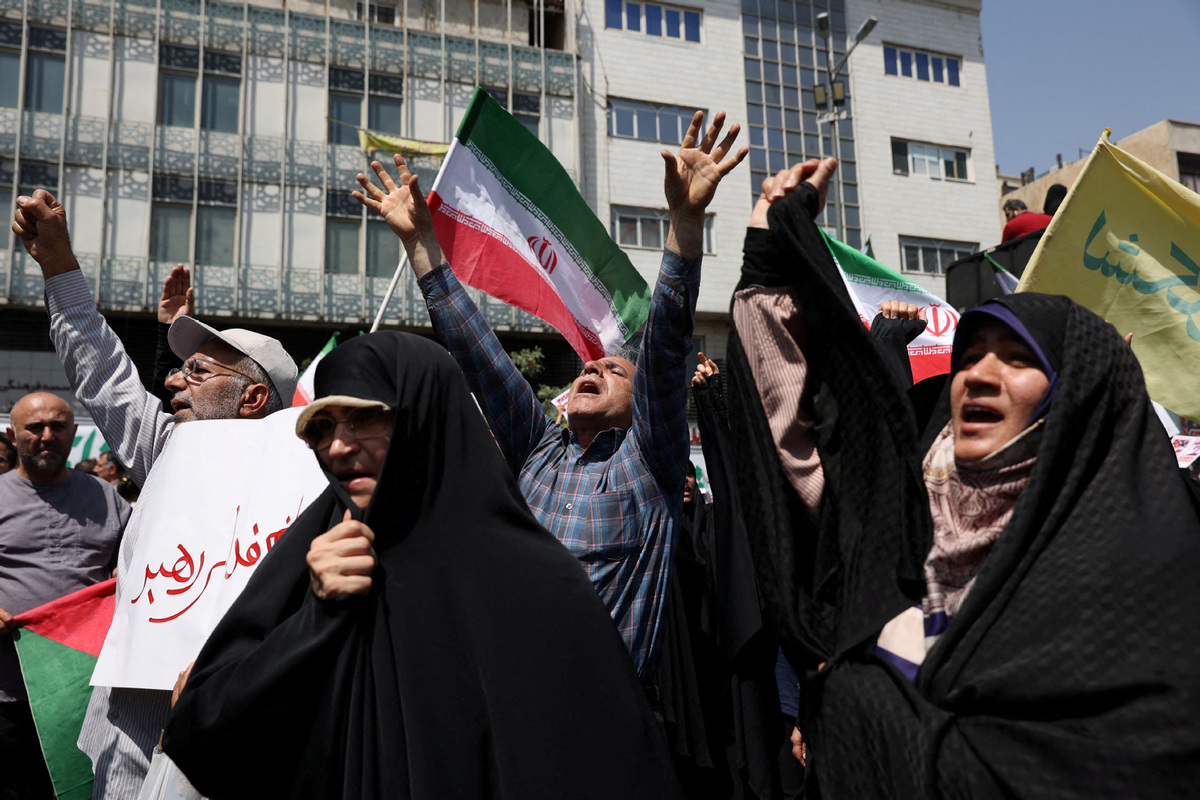
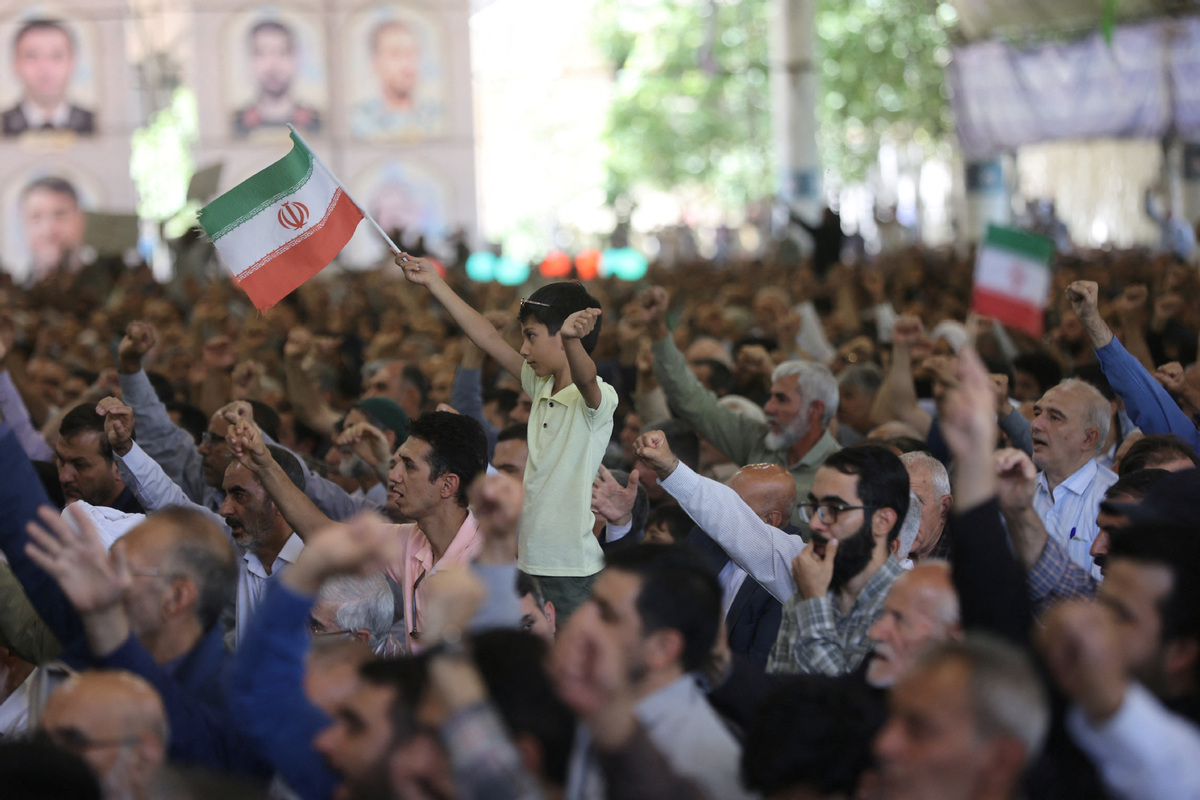
JERUSALEM - Israeli Prime Minister Benjamin Netanyahu said on Thursday that Israel had already destroyed "more than half" of Iran's missile launchers and was "capable of striking all of Iran's nuclear facilities".
In an interview with the Israeli Public Broadcasting Corporation, Netanyahu said seven days into the war, Israeli forces were ahead of schedule in their offensive against Iranian nuclear and missile sites, although he did not give a timeline for an end to the Israeli attacks.
The change or fall of Iran's leadership was not a goal of Israel's attacks but could be a result, he also said.
On Thursday, the Israel Defense Forces announced in a statement that it had launched a broad aerial campaign across Iran, including a strike targeting the inactive Arak nuclear reactor in western Iran.
Also on Thursday, missiles fired from Iran struck a hospital and residential buildings in Israel, wounding more than 30 people, according to Israeli health authorities and local media.
Iran's state news agency IRNA, however, said Iran targeted Israel's military intelligence facilities in its strikes on the southern part of the country on Thursday morning, not a hospital as was reported by some media outlets.
This latest exchange of fire marks a sharp escalation in hostilities that erupted after Israel launched airstrikes on Iran on June 13.
The surge in oil prices across Europe following Israel's recent strike on Iran could undermine the continent's efforts to diversify its energy choices, experts say.
Early on Thursday, Brent crude — widely considered as the benchmark for European oil — rose to $77.40 a barrel, up about 10 percent from a week earlier and nearing its highest level since January.
The price spike came just days after Israel launched an attack on Iran's nuclear facilities, prompting the evacuation of more than 300,000 residents from Teheran.
The effects are already being felt at the pump. In Belgium, official prices for key fuel products — B7 diesel and H0/H7 gas oil — have risen, with the supplier's website displaying upward arrows beside both.
Francois Villeroy de Galhau, governor of France's central bank, said on Tuesday that the European Central Bank was "in a good position" after cutting interest rates to 2 percent. However, he pointed to growing uncertainty as the conflict in the Middle East continues to push oil prices up sharply.
Lin Boqiang, dean of the China Institute for Studies in Energy Policy at Xiamen University in Fujian province, said the current rise can still be considered to be mild, but warned that prices could increase faster if regional instability worsens, such as the potential closure of the Strait of Hormuz.
According to the European Union's statistics agency Eurostat, Iraq, Saudi Arabia and the United States accounted for 6.5 percent, 7.5 percent and 15.5 percent, respectively, of oil exports passing through the Strait of Hormuz in 2023.
Liu Litao, an associate professor of international studies at Nanjing University in Jiangsu province, said Europe's alternative oil import channels are limited.
"Pipes from Russia hardly work anymore since the outbreak of the Russia-Ukraine conflict in 2022, while the civil war in Libya has curbed supply from Africa," Liu told China Daily.
"Therefore, Europe has to take the Middle East and the US as two key energy suppliers. But now, (with the latest instability,) the first path looks rather fragile."
Both Liu and Lin said that if the Strait of Hormuz were to be closed, the EU would have little choice but to turn to the US for oil, which might further curb its strategic independence.
The best outcome for both the EU and the global community is for the situation to be brought under control and order restored in the Middle East, Liu said.
A comment on Euractiv.com, a pan-European media network that specializes in EU affairs, noted, "Should the conflict persist, oil prices will almost certainly remain elevated, exacerbating the woes of Europe's long-suffering energy-intensive industries and potentially triggering a resurgence in price pressures that have eased considerably in recent months."
Qin Yan, a principal analyst at ClearBlue Markets in Oslo, Norway, said the possibility of oil prices going up too far is not good, considering the fact that the world economy remains weak.
"Oil prices are determined by the supply-demand relationship," she said.
"If it goes too high, for example, beyond $80 a barrel, quite a number of industries might have to curb production, instead of buying the expensive oil."
She also cited a report published by Morgan Stanley on Monday that gave three possible scenarios for oil prices in Europe, with the worst being that oil exports from the wider Gulf region are put at risk, in which case, "2022-style prices would not be out of the question".
zhangzhouxiang@chinadaily.com.cn
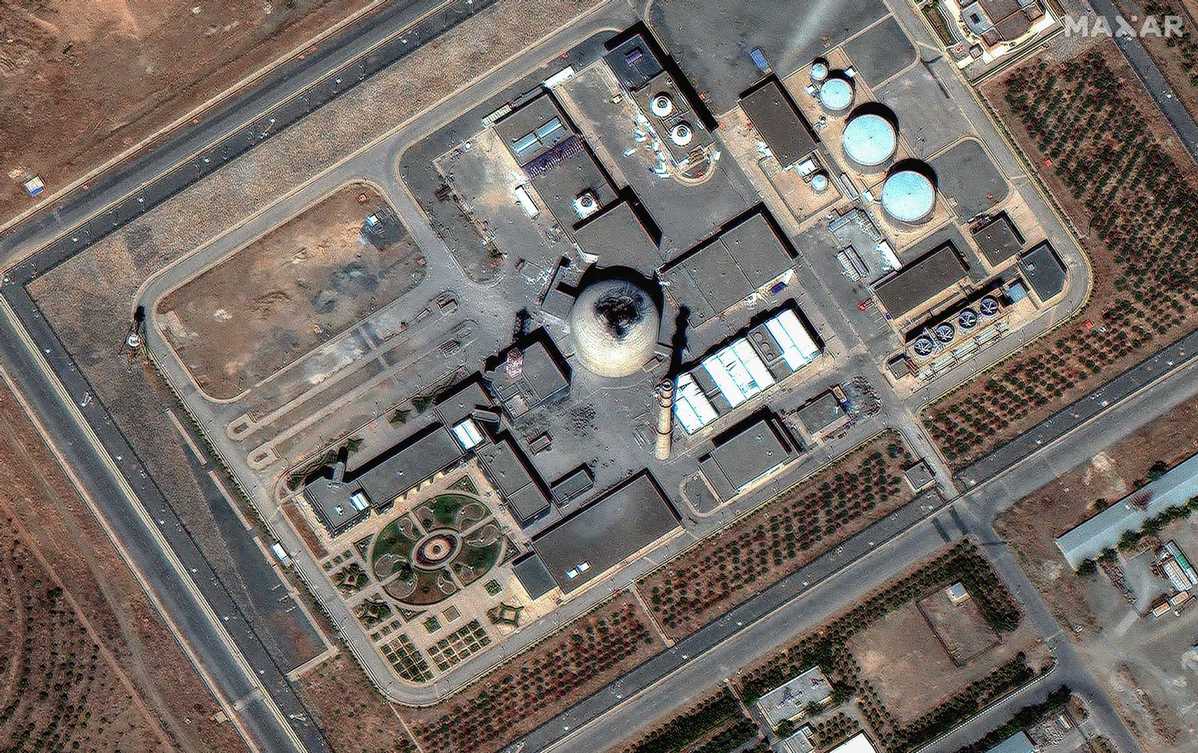
TEHRAN - Iran's atomic chief on Thursday called on the United Nations nuclear watchdog to immediately end its "inaction" and condemn Israeli attacks on Iran's "peaceful" nuclear facilities, according to the semi-official Fars News Agency.
Head of the Atomic Energy Organization of Iran Mohammad Eslami made the remarks in a letter addressed to President of the International Atomic Energy Agency (IAEA) Rafael Grossi following an Israeli strike on the Arak heavy water research reactor facility in Khondab County in Markazi province early Thursday.
Eslami called on the IAEA to immediately end its "inaction" and condemn Israel's actions, which are in contradiction with international law.
The conflict between Israel and Iran entered its seventh day on Thursday. It started after Israel on June 13 launched airstrikes on Iran, hitting the country's military and nuclear sites and killing several top military commanders and nuclear scientists.
Iran responded by also launching missile and drone attacks against targets in Israel.
Earlier on Thursday, a missile struck a building at Soroka Medical Center in southern Israel, injuring at least 71, according to Israel's Health Ministry.
Iran's mission to the UN refuted the claim, saying the strike was aimed at the Israeli army's C4I telecommunications corps headquarters and an intelligence facility.
The mission said Iran was committed to international humanitarian law and did not target civilians and non-military infrastructure.
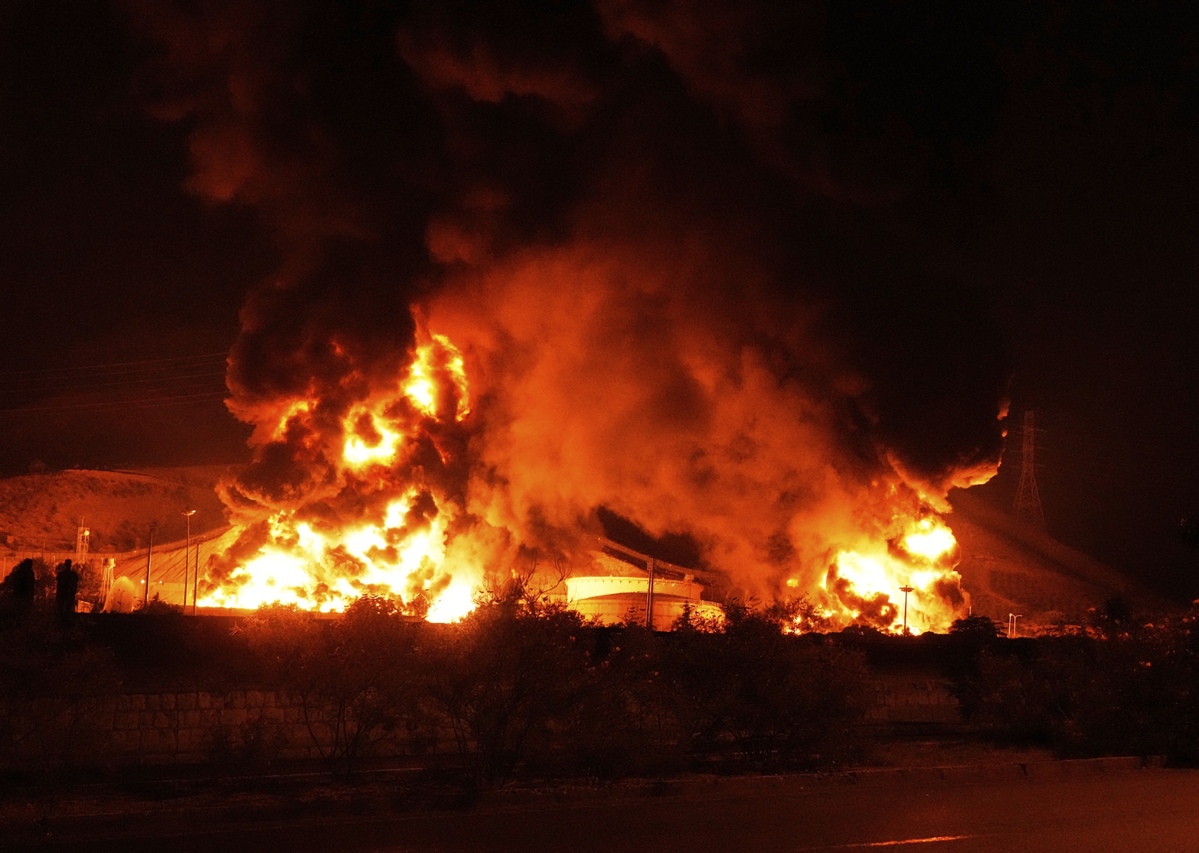
All eyes are on whether the United States would join Israel's bombardment of Iran's nuclear and missile facilities, as strikes escalated for a seventh day in the two rivals' conflict, with further damage to atomic energy sites deep in Iran.
Senior US officials are "preparing for the possibility of a strike on Iran in the coming days", Bloomberg News reported, citing anonymous sources.
The situation is still evolving and could change, the report said, with some sources pointing to potential plans for a weekend strike.
"Top leaders at a handful of federal agencies have also begun getting ready for an attack, one person said," it added.
Meanwhile, the Wall Street Journal reported that US President Donald Trump told aides on Tuesday that he had approved attack plans but was holding off to see if Iran would give up its nuclear program.
Trump declined to say on Wednesday whether he had made any decision.
"Nobody knows what I'm going to do," he told reporters. "I have ideas as to what to do, but I haven't made a final decision. I like to make the final decision one second before it's due because things change ... The next week is going to be very big."
Iran's Deputy Foreign Minister Kazem Gharibabadi said on Thursday that his country was ready to defend itself in case of escalation.
"If the US wants to actively enter the field in favor of the Zionist regime (Israel), Iran will have to use its tools to teach a lesson to both aggressors," he said. "Our military decision-makers have all the necessary options on the table."
On Wednesday, Iran's Supreme Leader Ali Khamenei rejected Trump's demand for an "unconditional surrender", calling the ultimatum "unacceptable".
"America should know that any military intervention will undoubtedly result in irreparable damage," he said.
Israel said on Thursday that it had struck Iran's Natanz and Isfahan nuclear sites. A military spokesperson initially said it had also hit Bushehr — the site of Iran's only functioning nuclear power plant — but a military official later said "it was a mistake" to have said this.
Earlier, Israel said it had hit another nuclear site near Arak overnight, where Iran was building a heavy-water reactor. Iranian media reported two projectiles hitting an area near the facility, which had been evacuated, and there were no reports of radiation threats.
The extent of the damage inside Iran from the week-old bombing campaign has become far more challenging to assess in recent days.
The country has stopped giving updates on the death toll, and state media have ceased showing widespread images of destruction. The internet has been almost completely shut down.
Hospital attack
Meanwhile, sirens sounded across Israel as the military said dozens of Iranian ballistic missiles hit at least four sites, including a hospital, and wounded nearly 50 people.
Iran said it was targeting Israeli military and intelligence headquarters near the hospital. The Revolutionary Guards said they had used the ultra-heavy Sejjil missile, with a range of 2,000 kilometers, for the first time.
After the hospital was attacked, Israeli Defense Minister Israel Katz said Khamenei "can no longer be allowed to exist".
"Khamenei openly declares that he wants Israel destroyed — he personally gives the order to fire on hospitals," Katz told journalists in Holon near Tel Aviv.
"Such a man can no longer be allowed to exist."
United Nations Secretary-General Antonio Guterres warned on Wednesday against any "additional military interventions" and called for immediate de-escalation leading to a ceasefire.
In Europe, foreign ministers from Britain, France and Germany, together with the European Union's top diplomat, will hold nuclear talks with their Iranian counterpart in Geneva on Friday, officials and diplomats said.
Agencies and Xinhua contributed to this story.
cuihaipei@chinadaily.com.cn
